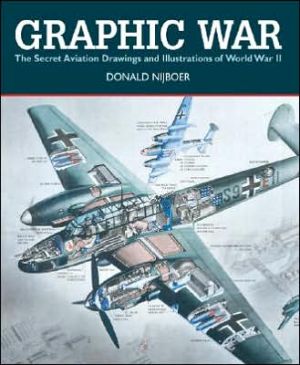

 |

|

The average rating for Graphic War: The Secret Aviation Drawings and Illustrations of WWII based on 2 reviews is 4.5 stars.
Review # 1 was written on 2014-08-17 00:00:00 Shawn Critchlow Shawn CritchlowIncredibly informational on Aircraft details, OOBs. several AARs and good analysis' included, very enlighting on air-to-ground attack effects in WW2 |
Review # 2 was written on 2013-07-08 00:00:00 Mark Cubitt Mark CubittThis book is not bad, but it's pretty old and thus out of date. But it's still a good one-volume starting point for the air war in WW2. The main arguments are that air power didn't win the war by itself, but that the lack of effective air power could lose the war. Air power thus was an important complement to winning the war and cannot be discounted. It worked with the other services together and that's why it was effective and, in his mind, "decisive." Essentially, the reason the allies won, according to Overy is almost totally because of material and production. The allies outnumbered their enemies by a huge margin, and there's just no other way around that. This is all hard to argue with, but there's some other good pieces in here, too. Overy doesn't talk as much about "tactical" vs "strategic" air power, but he does say that the Axis stuck closer to a "limited" vision of air power (tied to a single service, limited in support roles, etc.) vs the allies, which used a more "general" vision of air power (defined as using air power in all possible roles from tactical to operational to strategic--support and independent, etc.). Of course the generalists won. Overy also highlights the important of science, noting that among the Axis powers, the increased distrust of civilian institutions and the downplaying of the roles of academic science proved a major hindrance to them, as opposed to the allies, who cooperated more effectively in those realms. Where I start to take issue with the book is some of the details. There are of course minor problems of fact here and there (his insistence that America sent far less resources to the Pacific theater than we know to be true, his claim that 59 Japanese cities were firebombed, when the actual number is 66, etc.). But there are some broader interpretive things I take issue with. For example, he puts a lot more trust in the US Bombing Survey than I think is warranted--Overy oversells the effectiveness of strategic bombing and rates it as much more effective than I think it actually was--althoug he admits it never really had the effect of stopping or even slowing Nazi war production, he argues that said production would have been that much higher without the bombing. But he does seem to assume that strategic bombing was very effective--and in fact says repeatedly that one of Germany's biggest mistakes was not investing in long strategic bombing, and that this could have turned the tide as early as 1939-1940. It's hard to see how this is true, since Britain's own strategic bombing efforts that early were not effective and suffered massive losses. Also, like many western-produced histories of WW2, it almost ignores the Soviet Union's contributions. The Eastern Front air war is only very lightly discussed (although I'm sure the availability of sources in 1980 affected this), and the entrire Soviet effort and the effect it had on Germany is only barely mentioned. Overy doesn't even both to mention the massive Soviet ground attack against Japan in 1945 that obliterated their ground army in Manchuria, but instead attributes the atomic bombings alone for the Japanese surrender, which I think is a very incomplete picture. It actually would have strengthened his argument to show how the bombings and the Manchuria invasion worked together to compel surrender, rather than saying it was through air power alone in that case. These are mostly minor issues, the book is overall very good. Makes for a good starting point into the field, but also is really showing its age. There's been a lot more good work on this field in the years since--most of it standing on the shoulders of this work. |
CAN'T FIND WHAT YOU'RE LOOKING FOR? CLICK HERE!!!